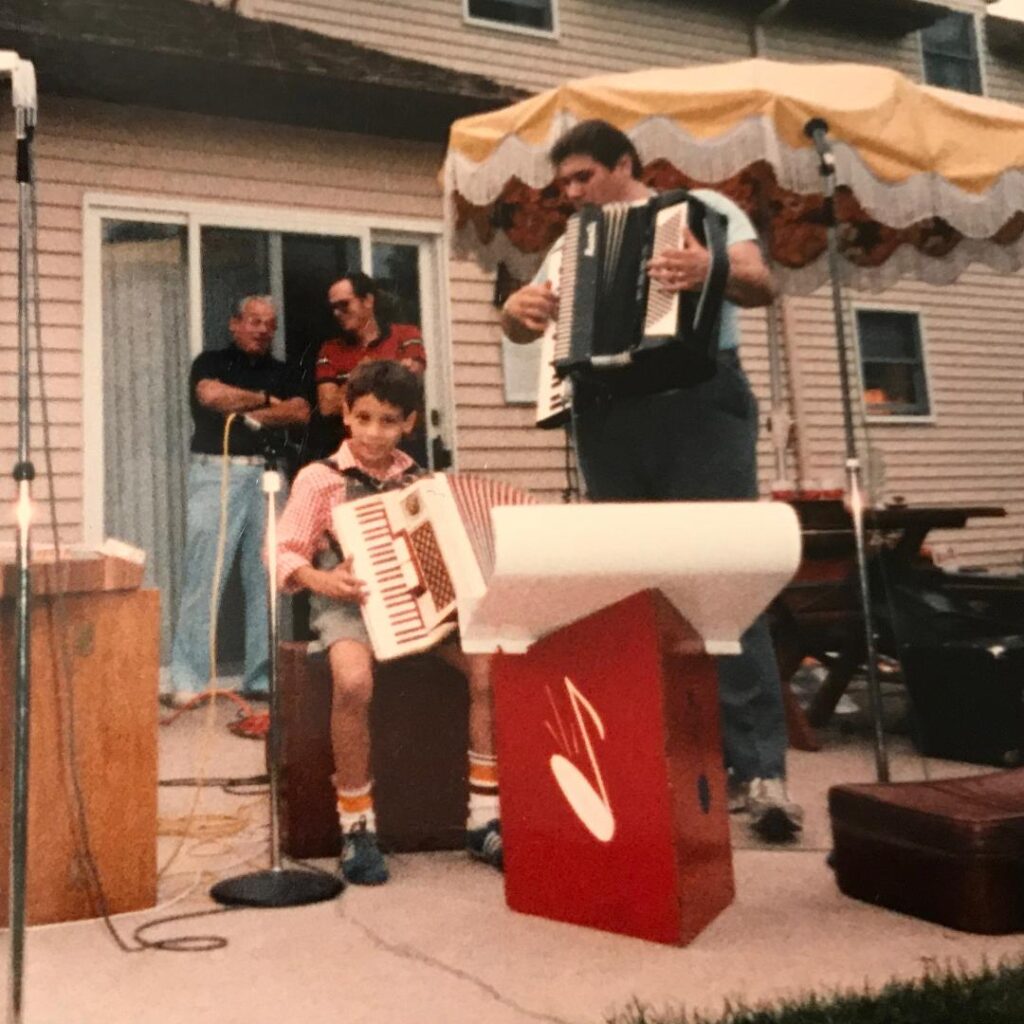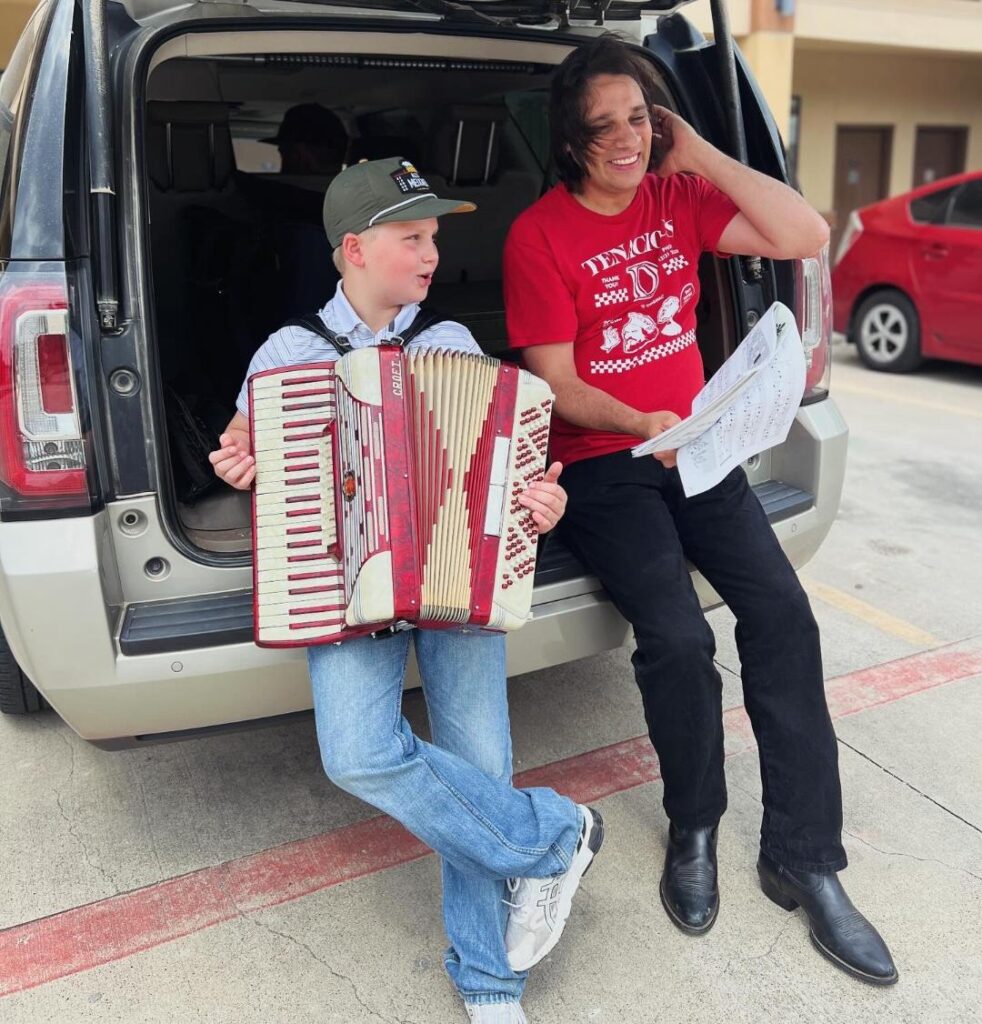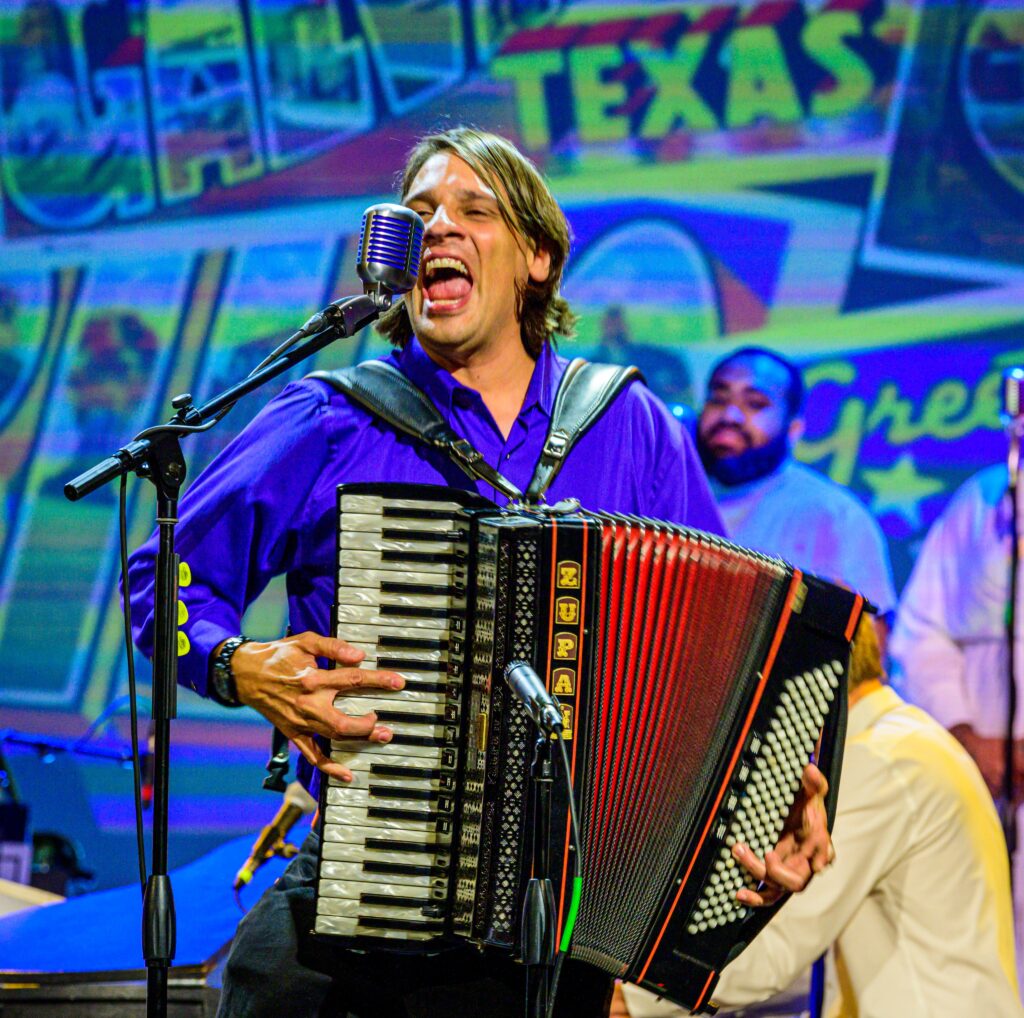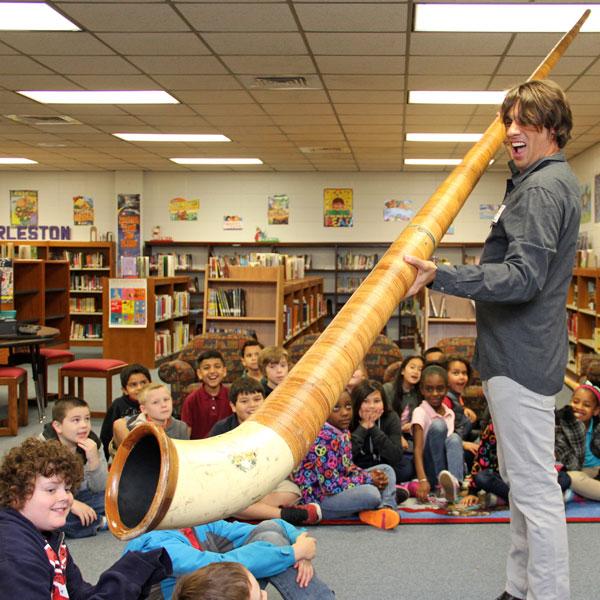Alex Meixner forms connections. Having played on over 80 albums, including Grammy nominations and wins, he has amassed a litany of honors in his career. He fronts the hardest working band in polka, playing 180 dates a year. When he isn’t bringing the gospel of polka to the masses, he spends his time raising his children and educating private students on accordion and musicality.
As a performer, he expends a tremendous amount of energy and graciousness connecting with every audience. “Meet the audience where they are,” he says, “Pull them in. Be genuine.” This translates into learning. Every student is different. Through patience and dedication, he meets students where they are. Then he takes them where they need to go.
“It’s a mixture of what they want to accomplish, what I think they can accomplish, and being open and ready to adapt,” he says.
Meixner recognizes the paramount importance of intergenerational connection. His student roster comprises kids from 10 to 82. He takes his music to schoolhouses and senior homes, bars and seminars. “Young people need to have older friends for wisdom and experience,” he says, “Old people need young people in their lives so they don’t become jaded, and they have the innocence and sense of exploration that a child has.”
An 82-year-old student of his insisted she had no interest or ability to play by ear. But the teacher knew he could take his student further. So he tricked her. He told her some of the songs in her workbook had been notated incorrectly, getting her to change notes on the fly. “You’re a turkey, Alex,” she exclaimed, realizing what was happening, “you’re making me play by ear!”
“I try to find something that builds on the student’s strength, their confidence, and their desire to improve,” he says.
When visiting a classroom he gets the children, ever curious, to tell him how an accordion works. “The best way to get kids into the instrument is hands down to get them in front of the instrument,” he says. They start going down the line of what each part does. “It’s physical, they touch the instrument. Which is the opposite of everything they’re learning.”
Meixner grew up in a time when kids fell down outside and got their hands dirty. But Meixner is no luddite. He insists our modern tools are objectively better, when used responsibly. Teachers need to guide students toward utilizing tech in a positive way. It was in the junior student teacher program at Ithaca College, while earning a B.M. in trumpet performance and music education, when Meixner was struck by something his advisor said: We’re never too old or too experienced to not have to look for information.
“We have unlimited resources,” he says, ”When I was in school, if somebody said I needed to develop an articulation like Clifford Brown, for example, if I didn’t already own the album, I had to buy it, or go to the library. Now I can go to YouTube and within seconds there you go, without any work.”
Meixner unironically teaches laziness. He encourages students to find the easiest way to get to the desired result with the least amount of effort. He quotes his father, who used to say, “Keep it sweet and simple, plain and pretty.”
Meixner’s father, Al Meixner, was a polka giant. Young Alex apprenticed in his father’s band for years. “My dad was ironclad as a bandleader. He was the boss,” he says. “My father was my first influence in every way. My mother was my first teacher.”

Being a bandleader is providing a kind of education to those in your employ. He uses the same techniques to reach an audience, or a student, within the band setting. If the drummer is too loud, Meixner doesn’t scold, he leads. He plays softer to bring the drummer down to the right level. He meets him where he is and brings him where he needs to be.
Working road bands like Meixner’s were hit especially hard by the response to the Covid pandemic in 2020. Meixner and his colleagues saw one gig after another canceled, their entire business model coming to a sudden halt. The intuitive sought silver linings. “I had stopped private teaching before COVID,” he says, “I didn’t have time. It was road work and gigging. I’d do an occasional clinic here and there. But that was gone. COVID made me get back to teaching, and I’m so thankful for that.”
As a fourth generation musician on his Austrian side, raised under the tutelage of the family band, Meixner is a conduit, with the duty to pass on information instilled in him from the original sources—the past generations—to future ones. Sharing his music on stages is just one aspect of this. Another crucial element is the one-on-one education the restructuring of the post-COVID era has allowed, reemerging at the perfect time in his life.
“I wish at 47 I knew everything I thought I knew at 18,” he says, “In middle age, surrounded by changes, watching elders pass on, trying to protect kids from mistakes that we have made. Life’s not fair. That has influenced my teaching.”
A good teacher knows what he does not know. “I’m not infallible. I pick the wrong book, I pick the wrong song. I think somebody’s ready for something that they’re not.”

It’s a balance. Balancing a touring schedule with a student roster. Balancing traditional methods of learning with modern technology. Guiding an audience or classroom with just the right amount of altruistic deception. Balancing life’s uncertainties with its blessings. The joyous and the heavy.
“Everyday when I wake up I have to choose happiness,” he says, adding, “It’s better to be happy than to be right.”
Knowing when to push and when to pull back.
While performing at a retirement community, Meixner realized no one was dancing, so he played a slow song. One couple rose for the gentle slow dance. He asks where they are from, taking a page from his father’s days strolling for tourists at Epcot Center. With this bit of information he pushes, suggesting they dance a polka. “Oh no,” the man protests, somewhat jovially. And now he has them. He plays the polka, the couple dances, not a worry in the world.

The music of our departed rings out in rippled overtones. A fragment of a melody can be a portal to other times and places. Accordions, with their deep, dark, cool bellows, are custodians of these songs of days and persons past.
Meixner’s father is with him still at every gig. His wooden road case with his stenciled name—Al Meixner—sits on every stage Alex Meixner graces, making sure the band is tight. Sometimes Meixner plays a song and, suddenly, as when skin is graced by a cool wind, it reminds him of his dad. “That melody is still there,” he says.
If Meixner could convey to his students the most vital of the many lessons he learned playing in his father’s band, it would be this: “Do your best. And accept the fact that your best today might not be what it was yesterday, and tomorrow might be better.”
Matt Powell is a writer and musician. His work explores the interconnectivity of all music and the people who create or listen. Matt’s work has been featured in Variety, No Depression journal, No Depression online, Emmys.com, Angels Flight—literary west, Humor in America, Community Works Journal, The Happy Music Center, Style Blueprint, Scanner Zine, Buck Mason Journal, and Temporary Detective. Learn more at www.theemattpowell.com

